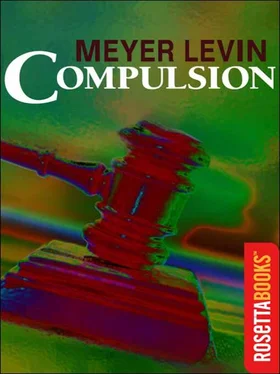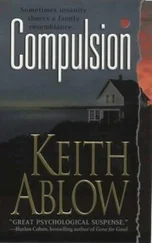Two large men entered. Obviously they were not entirely at ease in this imposing house. Their hands hung stiffly.
“Who is Judah Steiner, Jr.?”
Judd arose. Let Artie see he could handle it. After all, he had been through it once; Artie hadn’t.
“What can I do for you gentlemen?” Judd said.
“The state’s attorney wants to talk to you, Mr. Steiner. We’ll take you downtown.”
“Is this about the Kessler case?” he said blandly, watching their faces. One of them reacted as though he had been handed a confession.
The other looked suspicious. “Huh?” he said.
“Well, I’d be glad to tell the State’s Attorney all I know about it, although I already talked to Captain Cleary out in the South Chicago station last Saturday.”
“Captain Cleary?” They exchanged glances.
“Yes,” Judd said. “Out there where the poor kid was found. I go birding out there, and the captain asked me if I could help out, give him any ideas as to who might habitually visit the swamp out there.”
The impassive look came back over their faces.
Then this was more. This time it must be the spectacles. The second detective said, “We don’t know about all that. We’re just supposed to-”
“-bring me in,” Judd said easily, and they all chuckled. “Sure, let’s go.”
He glanced toward Artie. All kinds of things were on Artie’s face. It was almost the way Artie looked when playing drunk, pretending he didn’t quite know what was happening, and wasn’t really taking part. “Artie,” Judd said, “would you tell my folks, should they want to know my whereabouts?” Then he introduced the cops. “This is Artie Straus, a friend of mine, Mr.-”
“McNamara,” the first one introduced himself. The other said his name was Peterson.
A third dick was at the wheel of the car. Judd sat in the rear with McNamara. He offered cigarettes. No conversation started, so he tried the Carpentier fight as an opener. The cop thought the Frenchman would win. He hoped he could get there, but he might be busy.
“This case is keeping you on the go, I’ll bet.”
“You said it.”
“Perhaps it will be solved by then.”
The dick said nothing.
This was more serious than last Saturday, Judd felt sure. But assume they did have the glasses traced to him. Or suppose it was something that hadn’t been thought of at all? Fingerprints? Anything. The telltale atoms in the universe. Each atom left its trace.
But apparently they still had nothing on Artie. Artie should stay out unless caught. There was the wish for Attie to be with him, and a sly kind of counterwish, to be alone, to suffer punishment that would make him worthy of Ruth.
No, no sentiment. It was his mistake. The glasses in his pocket where they could fall out.
He was a stoic. He knew that all in the end was fated badly. A man should combat the putridity of life to the limit. Therefore he would go through everything without changing, without breaking. He would show himself consistent in his beliefs. Even to the execution.
But not Artie. Not Artie, dead. A wave of emotion returned as from some far distance, engulfing and washing out everything Judd might have felt for Ruth, his silly puppy love of the last few days, making him ashamed of the moment a few nights ago, after the whorehouse, when he had loathed Artie’s face. He saw Artie now, the laughing, easy college guy whom everyone loved – Artie standing at Judd Steiner’s execution, watching, talking with clever pity about the poor Judd he had known, a deranged genius. With the old quick pleasure, Judd saw himself on a scaffold, his hands tied behind him – on the scaffold as on a platform where slaves were sold in ancient times, sold or executed. Multitudes stood below, and great, immortal words of parting came from him, his legacy to mankind.
Ruth would weep.
Crap. He would not be defeated, not by such clods as were beside him. Now was the real test; now he would outwit everyone. Now was the chance to prove to himself that he was of another mental calibre, of another orbit entirely.
When the car stopped in front of the La Salle Hotel, Judd was surprised. The men escorted him through the lobby. “We’ve got a suite here,” Peterson offered. “The State’s Attorney don’t want to expose people, you know, if the papers get hold of it.”
It was a dead giveaway, then. They didn’t have anything for sure. The outcome depended on himself.
It was not only to protect innocent people from publicity that Horn had moved over to the hotel. There had been no such consideration for other suspects during the previous week. But after that frustrating, killing week, here was at last a hard clue. And Horn was simply at nerves’ end. His staff was exhausted. He didn’t want any distraction while he dealt with this one good lead. Because if this one petered out, the case seemed hopeless.
It would be conventional to suggest political importance. But I doubt if the State’s Attorney, any more than we reporters, thought predominantly of an effect on elections. All of us, including the police, were much more deeply embroiled. We were struggling with the first and lifelong problem of man – to find out how things happen.
Now, from the optician Horn had three names. Only three pairs of glasses of this prescription, encased in this new, expensive brand of frame, had been sold in Chicago.
Those three names could bring only bafflement and dismay to the prosecutor. One was a middle-aged lady piano teacher, who lived on the North Side. The other was a fairly prominent accountant. The third was the son of a millionaire, living in the Kessler neighbourhood.
The piano teacher was quickly eliminated. Her glasses were on her nose. The accountant had been out of town for the past three weeks. He had his glasses with him, he wired, and would be glad to show them to anyone designated by the authorities. That left Judah Steiner, Jr.
In the inner room of the suite, Horn gave his instructions. With his characteristic, choppy motion of the elbows, he emphasized that this had to be it. He wouldn’t have a trick remain untried even if the youth were the son of the mayor himself. Horn left the preliminaries to Joe Padua.
Padua had a liquid voice and liquid eyes, a touch of Rudy Valentino in the fluid way he moved. He was a tripper, because he could go along, polite and soft-toned, and then, in the conventional manner of a stage prosecutor, suddenly turn cold and murderous, a gun.
So Judd was brought up in the lift and into the suite. Joe Padua introduced himself, and his handshake was affable. His antagonist, Judd surmised, was in his thirties and probably a graduate of John Marshall or one of those downtown diploma mills. At once, Judd told of his interview with Captain Cleary. Padua, too, he saw, had known nothing of it. Glibly, Judd repeated how he frequently took his birding classes to that very area. He was sure he felt his opponent’s hostility shrinking.
Nevertheless, Padua tried. “We just wanted to ask you, Mr. Steiner, you do wear glasses?”
“Well, as I told Captain Cleary – in fact, I left a statement in writing with him – I did wear glasses for a while, when I was boning.” He put on a you-know-how-it-is smile. “I’m studying law, and this is quite interesting to me, my first practical contact; but as I was saying, the reading can get pretty heavy.”
“Don’t I know.” Padua gave him back the smile.
“I was getting headaches, so I had reading glasses prescribed, but the condition disappeared a few months ago.”
“You stopped boning?”
Judd chuckled. “Well, it’s curious, I still read just as much, but in any case the headaches ceased, so I don’t believe I’ve made use of the glasses in two or three months.”
Читать дальше












